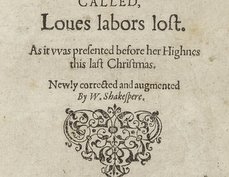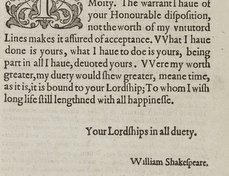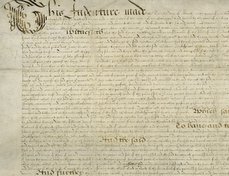What is implied by “Fellow”?
Modern speakers of English tend to regard “fellow” as a simple term of affection or of belittlement. Both senses occur in Twelfth Night, act 3, scene 4, lines 64, 83-4, when Olivia virtually dismisses Malvolio: “let this fellow be looked to.” Malvolio mistakenly interprets “fellow” as a sign of affection: “‘fellow’! Not ‘Malvolio,’ nor after my degree, but ‘fellow’!”
The Oxford English Dictionary, which records numerous shades of meaning for “fellow” over the years, lists, as its first definition:
One who shares with another in a possession, official dignity, or in the performance of any work; a partner, colleague, co-worker.
In Shakespeare documents, “a partner, colleague, co-worker” comes closest to the original meaning of the word “fellow,” especially when preceded by a possessive pronoun (his, my, our, their). When not preceded by a possessive pronoun it takes on the more general sense.
Both uses occur in The Return from Parnassus (Part II), a play from about 1601 which survives in manuscript, but was also printed twice in 1606. In a staged dialogue with Richard Burbage, William Kempe compares university playwrights with non-university playwrights:
Few of ye Vniuersitye men penne plaies well, they smell too much of yat writer Ouid, & yat writer Metamorphoses, & talke too much of Proserpina & Iupiter: why heeres our fellowe Shakspeare putts them all downe, I [=aye] and Ben Iohnson too: O yat Ben Iohnson is a pestilent fellowe, hee brought vpp Horace giuing ye poetts a pill; but our fellowe shakespeare hath given him a purge yat made him beraye his credditt.
Burbage replies: “Its a shrewd fellowe indeed” – probably referring to Jonson rather than Shakespeare.
The precise designation occurs in the examination of Augustine Phillips dated February 18, 1600, actually 1601, referring twice to other members of his playing company as "hys fellowes.” It occurs again in the warrant for payments to members of Shakespeare’s company and for their attendance as grooms of the chamber and players in August 1604:
... To Augustine Phillippes and John Hemynges for thallowaunce of themselves and tenne of their ffellowes his Maiesties groomes of the chamber, and Players …
To Thomas Greene for thallowaunce of himselfe and tenne of his Fellowes groomes of the Chamber and the Queenes Players …
The word “fellow” is employed with even greater precision in the will of Augustine Phillips, 1605, where it is used to designate specific legatees:
Item I geve and bequeathe to my ffellowe William Shakespeare a Thirty shillinges peece in gould, To my fellowe Henry Condell one other Thirty shillinge peece in gould, To my servaunte Christopher Beeson Thirty shillinges in gould, To my fellow Lawrence ffletcher Twenty shillinges in gould, To my fellowe Robert Armyne Twenty shillinges in gould To my fellowe Richard Coweley Twenty shill<inges>s in gould, To my fellow Alexsander Cook Twenty shillinges in gould, To my fellowe Nicholas Tooley Twenty shillinges in gould …
Each and every named “fellow” was a member of the playing company to which Augustine Phillips was attached, the King’s Men. The relationship was, moreover, reciprocal: if these men were Augustine Phillips’s fellows, he was their fellow.
Similarly, in William Shakespeare’s will, 1616:
… to my fellows Iohn Hemynges Richard Burbage & Henry Cundell xxvjs viijd A peece to buy them Ringes …
As Heminges, Burbage, and Condell were Shakespeare’s fellows, so he was their fellow.
The First Folio of 1623 contains several references, one in a poem by Leonard Digges entitled “To the Memorie of the deceased Authour Maister W. Shakespeare”:
Shake-speare, at length thy pious fellowes giue
The world thy Workes: …
Here, “thy … fellowes” are John Heminges and Henry Condell. Heminges and Condell use the term again in their dedication to the “Incomparable paire of brethren,” the earls of Pembroke and Montgomery:
… Onely to keepe the memory of so worthy a Friend, & Fellow aliue, as was our Shakespeare, by humble offer of his playes, to your most noble patronage. …
The expression occurs again in 1635, in a petition of John Shankes, a member of the King’s Men:
A peticion of Iohn Shankes to my Lord Chamberlaine shewing that according to his Lordships order hee did make a proposition to his fellowes for satisfaccion vpon his assigening [sic] of his partes in ye seuerall houses vnto them …
Finally, a specific usage of the abstract noun, “fellowship,” occurs in Hamlet (act 3, scene 2, lines 301- 304):
Would not this, sir, and a forest of feathers (if the
rest of my fortunes turn Turk with me) with <two>
Provincial roses on my razed shoes, get me a
fellowship in a cry of players?
In sum, “fellow” implies a common membership in an organization: in William Shakespeare’s case, this means that he, those who called him “fellow,” and those whom he called “fellow,” were all members of the Lord Chamberlain’s and King’s company of players.
Written by Alan H. Nelson









